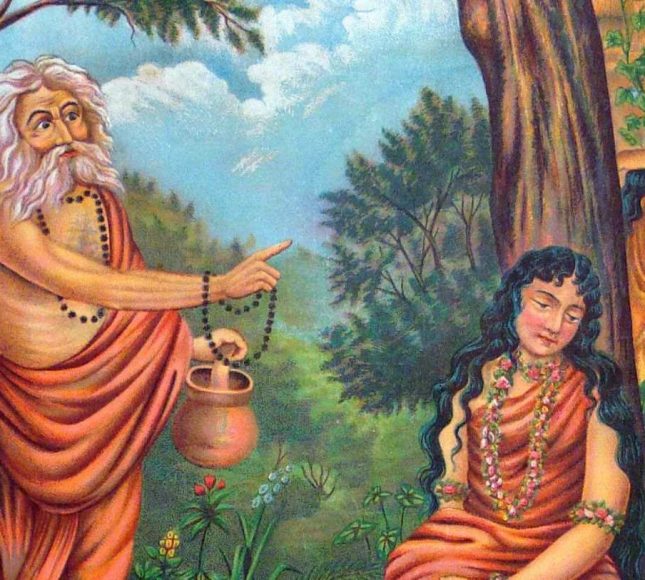DURVASAS (DURBASA) The Yadavas deceived Durbasas and reaped the fruit. (Dhanasari Namdev, p. 693) Sri Krishna was the most important member of the Yadava clan. Once the sages Durvasas, Vishwamitra, Kanva and Narada came to Dwarka. Some Yadavas in a playful mood broughi Samba, dressed as a pregnant woman before the sages and asked them derisively, what child, whether male or female would be born to Samba. The sages guessed the ruse played upon them and got very angry at the insult.
They (the name of Durvasas is prominently referred to in this connection) prophesied that whosoever would be born, would be the cause of the destruction of the whole of the Yadava elan. It is said that Samba gave birth to an iron rod as predicted. The Yadavas knew that the curse of the sages could\’never be untrue, therefore, they filed the rod into powder and threw it into the sea along with the remaining small piece of iron. When Sri Krishna was told about the incident, he said that all that was destined to happen. The powder of the iron rod thrown into the sea was washed ashore and it grew up like arrow-like grass.
When the period of destruction approached near, the Yadavas, under the influence of liquor fought with each other. They plucked the arrow-like grass, which turned into iron rods. These rods were freely used, which brought the destruction of the elan. The piece of iron thrown into the sea was swallowed by a fish. The same fish was purchased by a hunter, who utilised the iron piece found in the belly of the fish, as the tip of the arrow.
When the hunter went for a prey in the forest, Sri Krishna was reclining under a tree. He lay down on the ground immersed in Yoga, with his feet raised up. The hunter called Jara, saw Krishna\’s raised feet from a distance and mistook the same for a deer and shot it with his arrow. Sri Krishna expired at once. In this way the curse of the sages was fulfilled. There was an all-round destruction, because of i the curse of a sage. There was also a curse of Gandhari that the Yadava dynasty would be annihilated after thirty-six years and the same was fulfilled with the curse, of the sages.
References :
1. Kohli, Surindar Singh (ed), Dictionary of Mythological References in Guru Granth Sahib, 1993
Sage Durvasa in Hindu Mythology and Quotes in Guru Granth Sahib
Sage Durvasa is an iconic figure in Hindu mythology, known both for his profound spiritual wisdom and his legendary temper. As a revered sage, believed to be an incarnation of Lord Shiva, he plays a significant role in various mythological narratives, where his blessings and curses often serve as instruments of divine will. Beyond Hinduism, his character has also been referenced in the Sikh scripture, the Guru Granth Sahib, highlighting universal lessons on human behavior and spirituality.
Durvasa’s Legacy in Hindu Mythology
Durvasa’s life is punctuated by vivid episodes that capture the dichotomy of human emotions and their consequences. Among his most well-known tales is the encounter with King Ambarisha, where his wrath clashed with the king’s steadfast devotion. This story ultimately showcased the protective grace of Lord Vishnu and underlined the virtues of humility, forgiveness, and devotion.
Durvasa’s role as a bestower of boons is equally significant. For instance, the boon he gave to Kunti allowed her to invoke any deity and have children by their blessing—an act that shaped the lineage of the Pandavas in the Mahabharata. These stories reflect the sage’s influence on the cosmic order and his pivotal place in Indian mythology.
Quotes in the Guru Granth Sahib
The Guru Granth Sahib, the holy scripture of Sikhism, often references figures from Hindu and other spiritual traditions as allegories for moral and spiritual guidance. Durvasa appears in its verses as an example of the consequences of uncontrolled anger and pride. His temperament is contrasted with the Sikh ideal of equanimity and humility.
For example, one verse in the Guru Granth Sahib (Dhanasari Namdev, p. 693) mentions Durvasa’s actions to emphasize the value of remaining steadfast on the spiritual path, avoiding the pitfalls of ego and rage. While I cannot provide exact verbatim quotes due to copyright restrictions, the scripture uses his story as a metaphor for teaching ethical and spiritual lessons. These references encourage followers to cultivate forgiveness and focus on the eternal Divine truth.
Timeless Teachings
Sage Durvasa’s inclusion in both Hindu mythology and the Guru Granth Sahib reveals his enduring relevance. His life, marked by moments of divine power and human frailty, resonates across traditions as a reminder of the impact of our emotions and actions. The Guru Granth Sahib’s reflection on his character enriches its universal message, urging devotees to transcend anger and ego in pursuit of a higher spiritual connection.



